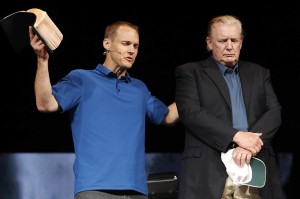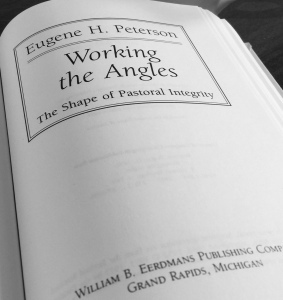“The Weekend Wanderer” is a weekly curated selection of news, stories, resources, and media on the intersection of faith and culture for you to explore through your weekend. Wander through these links however you like and in any order you like. Disclaimer: I do not necessarily agree with all the views expressed within these articles but have found them thought-provoking.
 “Jonathan Lee Walton named next president of Princeton Seminary” – Adelle M. Banks at The Christian Century: “Jonathan Lee Walton, an academician, preacher, and administrator who has served on the faculties of Wake Forest and Harvard divinity schools, has been named the next president of Princeton Theological Seminary. He will be the first Black president of the seminary, which was founded in 1812, and is to officially begin his new role on January 1, 2023. Walton, 49, who has been dean of Wake Forest University’s School of Divinity in North Carolina and dean of its chapel since 2019, will succeed President M. Craig Barnes, who has led Princeton’s seminary since 2013. ‘Theological education is at an inflection point,’ Walton said in a statement in the seminary’s October 14 announcement. ‘The church is changing. Society is changing. So we need clear-minded, faith-informed professionals who can speak hope, equity, and healing in all fields of human endeavor.’ Walton, whose scholarship has included evangelical Christianity, political culture, and mass media, is the author of Watch This! The Ethics and Aesthetics of Black Televangelism and A Lens of Love: Reading the Bible in Its World for Our World.”
“Jonathan Lee Walton named next president of Princeton Seminary” – Adelle M. Banks at The Christian Century: “Jonathan Lee Walton, an academician, preacher, and administrator who has served on the faculties of Wake Forest and Harvard divinity schools, has been named the next president of Princeton Theological Seminary. He will be the first Black president of the seminary, which was founded in 1812, and is to officially begin his new role on January 1, 2023. Walton, 49, who has been dean of Wake Forest University’s School of Divinity in North Carolina and dean of its chapel since 2019, will succeed President M. Craig Barnes, who has led Princeton’s seminary since 2013. ‘Theological education is at an inflection point,’ Walton said in a statement in the seminary’s October 14 announcement. ‘The church is changing. Society is changing. So we need clear-minded, faith-informed professionals who can speak hope, equity, and healing in all fields of human endeavor.’ Walton, whose scholarship has included evangelical Christianity, political culture, and mass media, is the author of Watch This! The Ethics and Aesthetics of Black Televangelism and A Lens of Love: Reading the Bible in Its World for Our World.”
 “Who Do You Say that I Am?: Protecting personhood in a newly dehumanizing era.” – Anne Snyder in Comment: “Andy Crouch’s new book, The Life We’re Looking For, begins with a profound observation: ‘Recognition is the first human quest.’ We come out of the womb, each of us, searching for a gaze. If we don’t find it for some reason, or we do but then it wanders elsewhere, the foundational ingredient for developing a sense of self is compromised. Children who endure sporadic or negligent attention in their earliest days ‘may possibly survive, but they do not thrive.’ ‘You have searched me, Lord, and you know me . . .’ We clearly do not graduate out of this vulnerability. Adults, too, need to feel seen to feel human. The enduring heart of human longing is the desire to be known and loved. To be human is to be called by name, not a number. It is to be attached to another, usually multiple others, and to negotiate the evolving shape of these attachments over a lifetime. It is to be perceived as legitimate, as a full participant in a family, a community, a workplace, a country. It is to have freedom to choose between good and evil, and to be capable of hurting—or healing—another. It is to be fragile, embodied, limited, mortal. It is to seek and make meaning, to feel pain, to desire, to honour, to worship. It is to hope that we are each particular and unrepeatable, even as we are desperate to know that we are never actually alone. North Americans are undergoing a mass crisis of recognition that is chipping away at all this and numbing our natures. Fifty-four percent of Americans say that no one knows them well. The number of adults without a romantic partner has increased by a third. Sixty-one percent of young adults feel lonely almost all of the time, and over half of young mothers feel the same.”
“Who Do You Say that I Am?: Protecting personhood in a newly dehumanizing era.” – Anne Snyder in Comment: “Andy Crouch’s new book, The Life We’re Looking For, begins with a profound observation: ‘Recognition is the first human quest.’ We come out of the womb, each of us, searching for a gaze. If we don’t find it for some reason, or we do but then it wanders elsewhere, the foundational ingredient for developing a sense of self is compromised. Children who endure sporadic or negligent attention in their earliest days ‘may possibly survive, but they do not thrive.’ ‘You have searched me, Lord, and you know me . . .’ We clearly do not graduate out of this vulnerability. Adults, too, need to feel seen to feel human. The enduring heart of human longing is the desire to be known and loved. To be human is to be called by name, not a number. It is to be attached to another, usually multiple others, and to negotiate the evolving shape of these attachments over a lifetime. It is to be perceived as legitimate, as a full participant in a family, a community, a workplace, a country. It is to have freedom to choose between good and evil, and to be capable of hurting—or healing—another. It is to be fragile, embodied, limited, mortal. It is to seek and make meaning, to feel pain, to desire, to honour, to worship. It is to hope that we are each particular and unrepeatable, even as we are desperate to know that we are never actually alone. North Americans are undergoing a mass crisis of recognition that is chipping away at all this and numbing our natures. Fifty-four percent of Americans say that no one knows them well. The number of adults without a romantic partner has increased by a third. Sixty-one percent of young adults feel lonely almost all of the time, and over half of young mothers feel the same.”
 “Study: Religion and spirituality can aid youth mental health crisis” – Kathryn Post at Religion News Service: “It’s no secret America’s youth are in crisis. Born into a tech-saturated world shaken by domestic terrorism, ecological devastation and economic instability, Gen-Zers are more likely to report mental health concerns like anxiety and depression than older generations. In many ways, the pandemic has forced mental health discourse into the limelight, prompting the U.S. surgeon general to issue an advisory last December on COVID-19’s “devastating” impact on youth mental health. A new study of 13–25-year-olds, from Springtide Research Institute, suggests spirituality could be part of the remedy — though for some young people, it also contributes to the problem. ‘I think religion … is a place to find belonging. It’s a place to connect with a higher purpose, which is a calling from God in my understanding,’ said Mark, 22, an interviewee cited in the report. ‘I think it’s also, for many people, a restriction of freedom and sort of obligation, which creates a lot of shame in people’s lives.’ In general, the report — which is based on qualitative interviews as well as fielded surveys — finds that having religious/spiritual beliefs, identities, practices and communities are all correlated with better mental wellness among youth.”
“Study: Religion and spirituality can aid youth mental health crisis” – Kathryn Post at Religion News Service: “It’s no secret America’s youth are in crisis. Born into a tech-saturated world shaken by domestic terrorism, ecological devastation and economic instability, Gen-Zers are more likely to report mental health concerns like anxiety and depression than older generations. In many ways, the pandemic has forced mental health discourse into the limelight, prompting the U.S. surgeon general to issue an advisory last December on COVID-19’s “devastating” impact on youth mental health. A new study of 13–25-year-olds, from Springtide Research Institute, suggests spirituality could be part of the remedy — though for some young people, it also contributes to the problem. ‘I think religion … is a place to find belonging. It’s a place to connect with a higher purpose, which is a calling from God in my understanding,’ said Mark, 22, an interviewee cited in the report. ‘I think it’s also, for many people, a restriction of freedom and sort of obligation, which creates a lot of shame in people’s lives.’ In general, the report — which is based on qualitative interviews as well as fielded surveys — finds that having religious/spiritual beliefs, identities, practices and communities are all correlated with better mental wellness among youth.”
 “The Virtue of Noticing: Refusing numbness and recovering wonder.” – L. M. Sacasas in Comment: “Few questions, it seems, are more important for us to consider at present than this: What does it mean to be human? But it is a perennial question, asked by thoughtful people for ages and answered in diverse and conflicting ways. The stakes have always been high, and no single answer can be taken for granted. In our time the question has centred at least in part on the possibility of fundamentally transforming the human being by the application of human knowledge and power. Indeed, it is not uncommon to encounter explicit calls for a post-human future, one in which the human condition is radically altered or altogether transcended. At the same time, however, others warn of the possibility that we might descend from rather than transcend the human condition. The usual agent of change in each case, enabling either the utopian ascent or the infernal descent of humankind, is “technology.” Rather than adjudicating among these competing visions or proposing a full account of the meaning of the human, I want to focus on one seemingly neglected human capacity, which may not exclusively define the human but which certainly characterizes it: the capacity for wonder. Particularly, I want to focus on two questions: How has our technological milieu affected our capacity to experience wonder? And how, in turn, has this affected how we think about the human condition?”
“The Virtue of Noticing: Refusing numbness and recovering wonder.” – L. M. Sacasas in Comment: “Few questions, it seems, are more important for us to consider at present than this: What does it mean to be human? But it is a perennial question, asked by thoughtful people for ages and answered in diverse and conflicting ways. The stakes have always been high, and no single answer can be taken for granted. In our time the question has centred at least in part on the possibility of fundamentally transforming the human being by the application of human knowledge and power. Indeed, it is not uncommon to encounter explicit calls for a post-human future, one in which the human condition is radically altered or altogether transcended. At the same time, however, others warn of the possibility that we might descend from rather than transcend the human condition. The usual agent of change in each case, enabling either the utopian ascent or the infernal descent of humankind, is “technology.” Rather than adjudicating among these competing visions or proposing a full account of the meaning of the human, I want to focus on one seemingly neglected human capacity, which may not exclusively define the human but which certainly characterizes it: the capacity for wonder. Particularly, I want to focus on two questions: How has our technological milieu affected our capacity to experience wonder? And how, in turn, has this affected how we think about the human condition?”
 “Why Bad Catholics Make Great Art” – Nick Ripatrazone in The Millions: “‘Now, you know, I’m a Catholic,’ Toni Morrison told Cornel West during a 2004 conversation at The Nation Institute. ‘We’re used to blood and gore. On the cross in the church, there’s the body, with the cuts and all the bruises.’ Though Morrison was a self-described ‘disaffected Catholic,’ she was a Catholic nonetheless: She converted when she was 12 and took Saint Anthony of Padua as her baptismal name. She found herself ‘fascinated by the rituals’ of the faith and was especially transfixed by the ornate, almost otherworldly experience of Latin Mass. But she had what she called ‘a moment of crisis’ on the occasion of the Second Vatican Council in the 1960s, which largely abolished the liturgical use of Latin, which she saw as “the unifying and universal language of the Church.’ Morrison, who had a wry sense of humor, would later call herself a ‘lapsed Catholic’—a bad Catholic. The Nobel laureate was in good company: bad Catholics often make great art. Smells, bells, blood, guts, spectacle, and of course, bodies, bodies, bodies. Catholicism is a deeply theatrical religion based in provocative stories. The faith has inspired many gifted artists, and certainly a number of them remained devoted to their beliefs. Yet some of the best Catholic storytellers achieve their power at a distance from traditional devotion. These bad Catholics are able to draw upon a rich array of imagery, symbolism, and story—and while they might not be conventionally doctrinaire, their work is undeniably Catholic. To be clear, I don’t mean ‘bad’ in the pejorative sense, as if I am claiming that these artists are to be judged for not being dogmatically solid Catholics. (As a cradle-to-now Catholic myself, I’d love it if we did a lot less judging.) Rather, I use “bad” to capture the significant number of Catholics who are lapsed, unsatisfied, tired, checked out; the people who don’t go to Mass often (or ever), but who still make the sign of the cross to calm their nerves, or holds a special place in their heart for the Virgin Mary. Once a Catholic, always a Catholic—a dictum that is true both theologically and emotionally.”
“Why Bad Catholics Make Great Art” – Nick Ripatrazone in The Millions: “‘Now, you know, I’m a Catholic,’ Toni Morrison told Cornel West during a 2004 conversation at The Nation Institute. ‘We’re used to blood and gore. On the cross in the church, there’s the body, with the cuts and all the bruises.’ Though Morrison was a self-described ‘disaffected Catholic,’ she was a Catholic nonetheless: She converted when she was 12 and took Saint Anthony of Padua as her baptismal name. She found herself ‘fascinated by the rituals’ of the faith and was especially transfixed by the ornate, almost otherworldly experience of Latin Mass. But she had what she called ‘a moment of crisis’ on the occasion of the Second Vatican Council in the 1960s, which largely abolished the liturgical use of Latin, which she saw as “the unifying and universal language of the Church.’ Morrison, who had a wry sense of humor, would later call herself a ‘lapsed Catholic’—a bad Catholic. The Nobel laureate was in good company: bad Catholics often make great art. Smells, bells, blood, guts, spectacle, and of course, bodies, bodies, bodies. Catholicism is a deeply theatrical religion based in provocative stories. The faith has inspired many gifted artists, and certainly a number of them remained devoted to their beliefs. Yet some of the best Catholic storytellers achieve their power at a distance from traditional devotion. These bad Catholics are able to draw upon a rich array of imagery, symbolism, and story—and while they might not be conventionally doctrinaire, their work is undeniably Catholic. To be clear, I don’t mean ‘bad’ in the pejorative sense, as if I am claiming that these artists are to be judged for not being dogmatically solid Catholics. (As a cradle-to-now Catholic myself, I’d love it if we did a lot less judging.) Rather, I use “bad” to capture the significant number of Catholics who are lapsed, unsatisfied, tired, checked out; the people who don’t go to Mass often (or ever), but who still make the sign of the cross to calm their nerves, or holds a special place in their heart for the Virgin Mary. Once a Catholic, always a Catholic—a dictum that is true both theologically and emotionally.”
Music: Donny McClurkin with Richard Smallwood, “Total Praise,” from Psalms, Hymns, and Spiritual Songs







 “
“














 This post continues my reflections on Eugene Peterson’s book
This post continues my reflections on Eugene Peterson’s book